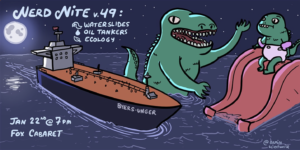You may have enjoyed waterslides around Vancouver or West Edmonton Mall. However, you’ll only find the best ones in larger or warmer cities.
This talk will cover some of the basics required to be a good waterslide tester, some aspects of waterslide design, and recommendations for how to enjoy a world-class waterpark experience.
Bio: Shane is a professional mechanical engineer whose career transitioned from submarine designer to waterslide tester. He is currently a product manager for waterslides at WhiteWater West.
3. Oil Tankers 101
Kayla Glynn
When you hear tankers, what comes to mind? Oil tankers are a hot topic in Vancouver. They’re in the news all the time and everyone has an opinion on how safe they are, or what risks they pose. However, many don’t know the basics. Get the facts. Learn the information you need to be informed and join the conversation on marine safety.
Bio: Kayla is an ocean enthusiast. She earned her Masters in Marine Management at Dalhousie University, studying compensation for environmental damage caused by ship-source oil spills. Passionate about sharing her knowledge of the ocean with others, Kayla’s shifted her focus to the realm of science communication to help more people foster a deeper relationship with science and the ocean. Kayla now works as a producer at The Story Collider, a non-profit dedicated to sharing true, personal stories about science, where she hosts live storytelling events and leads workshops on behalf of the organization. Follow her at @kaylamayglynn and catch her live on the Story Collider stage on February 11th, 2020!
